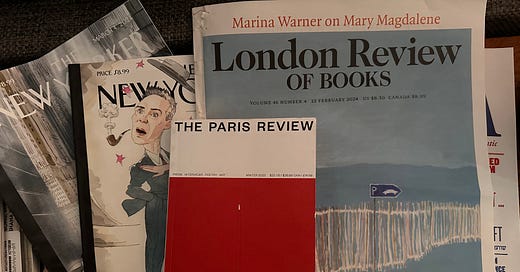Hi friends!
Today’s newsletter is a new format. It features a collection of five bits & pieces I’ve been collecting and taking notes on all month long — kind of like a literary round-up of thoughts and ideas and observations, as well as a list of articles and books I’ve enjoyed this month.
This month, you’ll find out:
How the way Edith Wharton writes about socialite “downfalls” reminds me of Lindsay Lohan
Why I’m not sure I actually liked Succession (which I finally finished this month)
What I loved about Jodie Foster’s interview with The Atlantic on aging with authenticity
How I’m being more intentional about screen time
The classic realist author I unexpectedly thought about while I rewatched the pilot of The OC last weekend
This week’s newsletter is a new offering for paying subscribers, and will come out the last Sunday of every month. For access to monthly musings, and to the full archive of posts here on Closely Reading, upgrade to a paid subscription.
ONE
Reading The House of Mirth while watching the media circus around the Princess of Wales’ announcement about her cancer diagnosis, and after watching that Nickelodeon documentary about abused child stars, has had me thinking about that gruesome period in my teenage years when all the girls I’d grown up watching — Amanda Bynes, Paris Hilton, Britney Spears, Lindsay Lohan — suddenly became a big joke to everyone and I never understood why.
The wild paparazzi shots of panty-less club dresses; the toxic relationships; that time an obviously terrified Britney shaved her head and cried on the street. All those girls I loved to watch and listen to seemed to meet the same fate:
“The winsome child star became a paparazzi-hounded L.A. party girl, and then a faded and troubled starlet whose downward trajectory included multiple D.U.I. arrests and subsequent probation violations, several court-ordered rehab stays, and conflict with her media-hungry father.”
Naomi Fry for THE NEW YORKER
In the latest chapters we read for the Mirth read-a-long, the beautiful and glamorous Lily Bart — a chic socialite with a dwindling bank account and no husband — takes a rapid decline in reputation, in large part thanks to the skewed perception, endless speculation, and cruel gossip about her.
Yet it’s not really Lily’s actions — and the visibility or invisibility of those actions to others — that truly fuels her downfall. It is her conspicuous appearances in the wrong places and her disappearing acts in the wrong moments that lead her society to endlessly speculate about her motives. It doesn’t take long for everyone else to decide she’s a nefarious, dangerous, even slutty woman, and to turn their backs on her, accordingly.
Lily’s downfall in The House of Mirth had me reflecting on how we see these same patterns — of society turning on beautiful and interesting women, precisely because of the visibility of their sexuality and desires — and how the story hasn’t really changed that much.
Keep reading with a 7-day free trial
Subscribe to Closely Reading to keep reading this post and get 7 days of free access to the full post archives.





